16 Green Flags in Dating That Reveal a Genuine Keeper

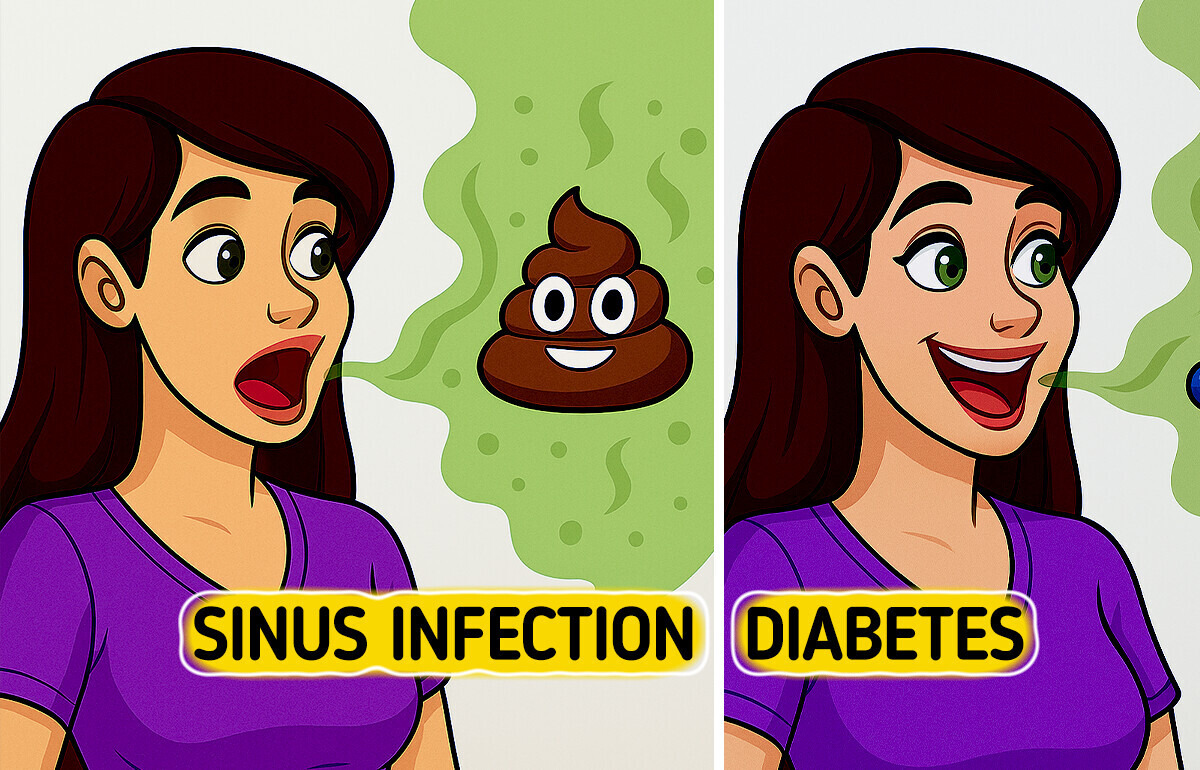
Bad breath can knock your confidence, especially because it’s easier for other people to notice than yourself. So being aware of the type of bad breath you have and what it says about your overall health, can help you understand how to fix it. The article below looks at 12 different kinds of bad breath odors and some of the conditions that cause them.
CONTENT IS PROVIDED FOR INFORMATIONAL PURPOSES ONLY AND IS NOT INTENDED AS A SUBSTITUTE OF MEDICAL ADVICE. SEEK GUIDANCE OF YOUR DOCTOR REGARDING YOUR HEALTH AND MEDICAL CONDITIONS.
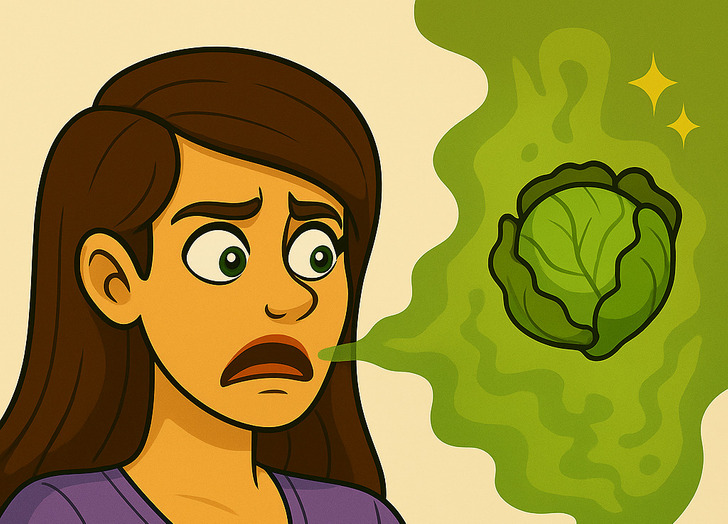
This smell is often associated with a genetic condition called Hypermethioninemia. People with this rare genetic disorder have changes in certain genes that affect how their body works.
Although some people with this condition don’t experience symptoms, others have body odors like boiled cabbage in their breath, sweat, or pee and experience problems with their nerves and liver.
The smell happens because the body can’t break down an amino acid called methionine, which builds up and causes the odor.
This smell can also happen from liver disease or eating too much protein.
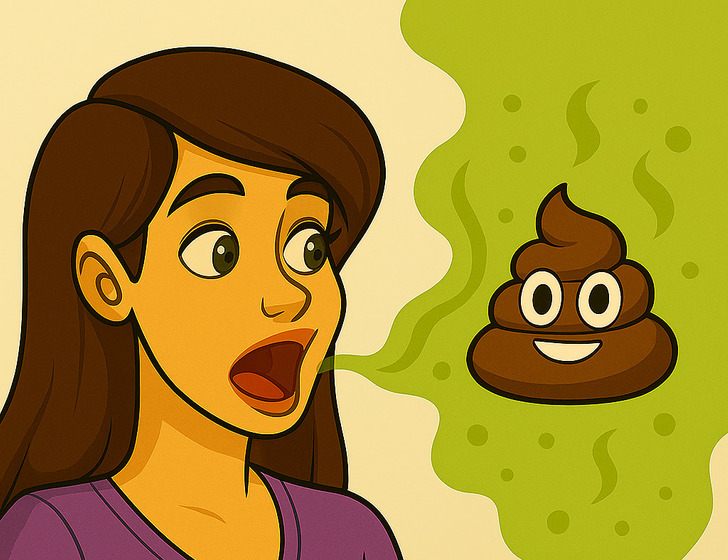
It may be embarrassing, but help is at hand. A breath that smells like feces can have several possible causes, ranging from mild issues to serious health conditions.
Possible causes:
You should seek emergency medical help if you’re in severe pain, have swelling in your face, or show signs of dehydration like a very dry mouth, dark or little urine, or extreme thirst. Other warning signs include a high fever, vomiting something that smells like feces, possible bowel blockage, or if you become confused, disoriented, or pass out. These symptoms could point to a serious health issue that needs urgent attention.
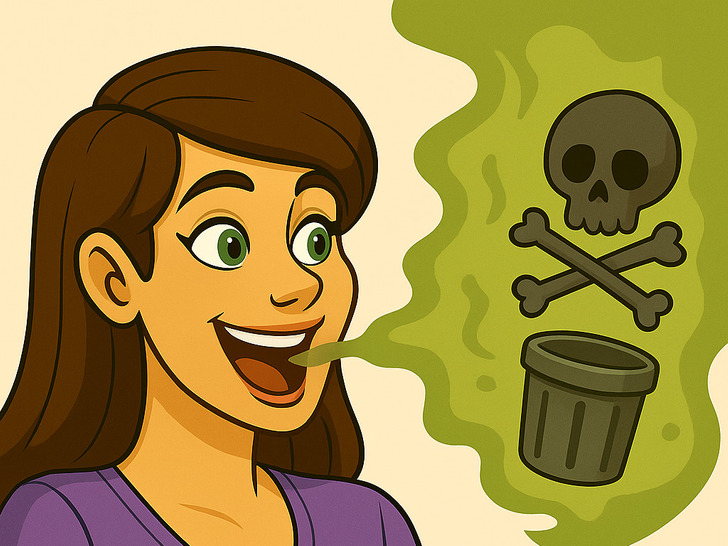
“It smells like death” isn’t just an expression. Having a rotten or fetid smell on your breath is one of the most common types of bad breath odors. It can be caused by Granulomatosis, which is a rare inflammatory disorder that affects blood vessels, kidneys and nose. This condition can become worse if left untreated.
Other possible causes include: Infections or abscesses in the mouth, throat, or lungs, openings in your mouth such as cavities, ulcers, lesions and fistulas, gum disease; when dental devices like dentures or braces don’t fit well, food getting stuck between the gaps and the growth of bacteria will produce this death-like smell.
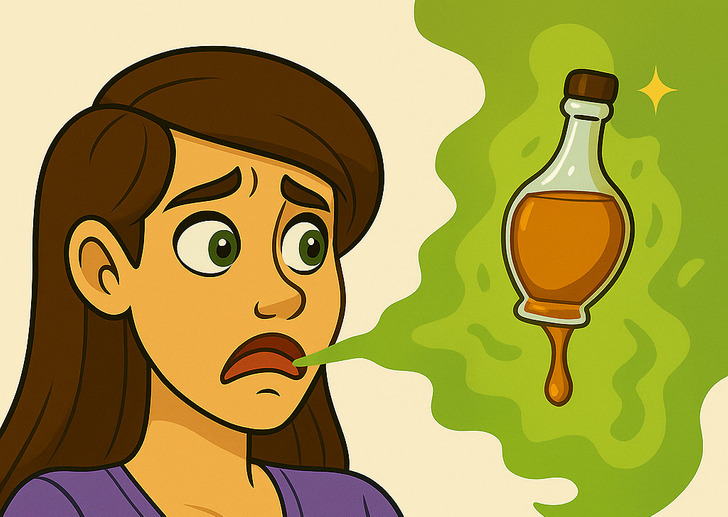
Not only your breath, but your urine as well may have a maple syrup or caramelized sugar smell and this is caused by a rare genetic disorder known as Maple Syrup Urine Disease (MSUD). This is a condition where the body can’t break down certain proteins, leading to a dangerous build-up of harmful substances.
This condition is a life-long condition that is inherited and affects 1 in 185 000 babies around the world.
Early signs in babies include: Pee, sweat, or earwax that smells like maple syrup, tiredness, low energy, or weak movements, fussiness or irritability and not wanting to eat.
If untreated, it could progress to a metabolic crisis, which includes: strange body movements (like stiffening or arching), seizures (shaking uncontrollably), vomiting, passing out or coma.
A metabolic crisis is life-threatening. If you see these signs, get emergency help right away.

It’s not always from eating seafood that one can develop fishy breath. There might actually be an underlying condition.
The first is Trimethylaminuria — a genetic disorder that can leave you with fishy sweat, urine and breath, because your body doesn’t know how to break down trimethylaminuria.
If your only symptom is fishy-smelling breath, a dentist can check for common causes like gum disease or oral infections. But if your mouth is healthy, or you also have a fishy body odor, it’s time to see a doctor.
There’s no cure for TMAU, but symptoms can be managed. This includes making diet changes to avoid foods high in trimethylamine, using antibiotics to adjust gut bacteria, and taking activated charcoal to help remove trimethylamine from your body.
Certain foods can make the fishy smell worse. So try to avoid: Seafood (some freshwater fish might be okay), shellfish, liver and kidney, milk, eggs, beans and peanuts. Avoiding these foods can help reduce the odor.
If you notice this kind of breath and feel unwell, it’s important to see a doctor right away.
This smell can also be caused by kidney failure.

Similar to the fruity breath, if your breath smells like nail polish remover or acetone, it could mean there are too many ketones — acids made by your liver — in your blood. When your body starts using stored fat for energy instead of carbs, this creates a chemical called acetone as a byproduct.
Possible causes include: Low-carb diets, type 1 diabetes, but it can also happen in type 2 diabetes if a serious condition called diabetic ketoacidosis (DKA) develops. Keto diets and fasting also produce acetone.
If you have diabetes and your breath smells like acetone (nail polish remover), follow your doctor’s plan, usually this means taking insulin to keep your blood sugar and ketones under control.
If you’re still smelling acetone even with treatment, or you don’t have diabetes but notice this smell often, call your doctor to get it checked out.
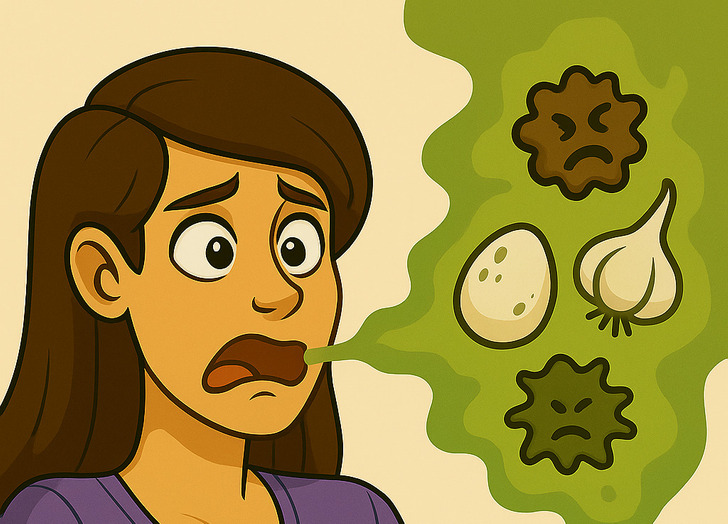
When your liver can’t clean toxins, it causes a musty, stale smell which is included as a symptom of fetor hepaticus — a condition of bad breath that’s classified as a distinct smell on the breath of someone with liver disease. That same smell can also be detected on the person’s pee or sweat.
A possible cause is liver disease, like cirrhosis. With this condition, breath usually has a musty, rotten eggs or garlic like-smell that lasts for a while, or is reoccurring.
Fetor hepaticus is a serious sign that your liver disease may be getting worse.
Even if you already know you have liver problems, this smell means you should see a doctor right away to get treatment and avoid dangerous complications.

If your breath or mouth tastes metallic, it could be caused by several things including: dental issues — gum disease, tooth infections, or poor dental hygiene which can cause a metallic smell or taste. Brushing, flossing, and seeing a dentist can usually fix it.
Medications & supplements can change how your mouth tastes or smells. These include antibiotics, painkillers, allergy meds, or even vitamins. It usually goes away after stopping the medication.

Just because it’s fruity, doesn’t mean it’s good. Sweet or fruity breath odor might actually be life-threatening. The smell is caused when the body makes chemicals called ketones when it burns fat, which can smell sweet, fruity, or metallic.
Possible causes are diabetes that isn’t being managed well and low-carb diets or fasting causes an odor in your breath — for some it can be metallic and for others it can be a sweet odor.

Acid reflux (GERD) is a condition that causes stomach acid to come back up into your throat. It can make your breath smell sour and sometimes bring up bits of food or liquid into your mouth.
You can also make simple lifestyle changes to feel better and improve your breath. Try to not lie down after eating, use a wedge pillow, eat smaller meals. Avoid foods that trigger acid reflux, like onions, garlic, spicy or fatty foods, chocolate. Drinking plenty of still water, eating more fiber, and chewing gum can also help keep your breath fresh and reduce reflux.

Breath that smells like ammonia or urine may be a sign of azotemia, a condition where the body can’t get rid of waste properly.
Ammonia-smelling breath can also be a sign of kidney problems. Your kidneys are supposed to remove waste like urea from your blood, but when they aren’t working well, urea builds up and turns into ammonia, which can make your breath smell like chemicals or pee.
Kidney disease can also weaken your bones, including the ones around your teeth, so it’s important to pay attention to any strange breath smells, as they might be a sign of something more serious.
To deal with ammonia breath, the most important step is to treat the underlying health problem, like high blood pressure, diabetes, or a kidney injury. Until then, you can mask the smell by brushing your teeth often, cleaning your tongue, drinking lots of water, avoiding strong-smelling foods, and chewing sugar-free gum.
Also, make sure to see your doctor and dentist regularly to stay on top of your health and catch any issues early.
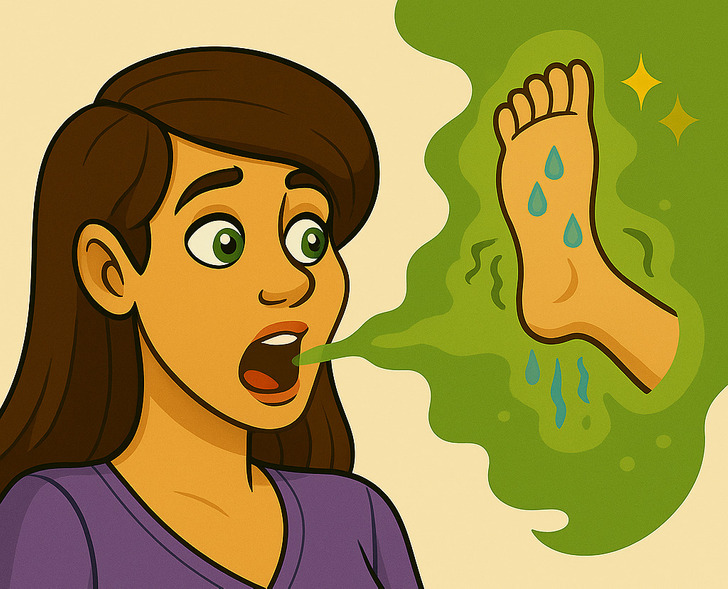
Your breath can take on the smell of sweaty feet when the body’s unable to create the right type of enzymes to break down certain amino acids in the body. This might be due to an enzyme disorder known as Isovaleric Acidemia. It is a rare condition where too much isovaleric acid builds up in the body. Isovaleric acidemia can cause mild to life-threatening health problems.
In severe cases, symptoms show up just days after birth, such as: poor feeding, vomiting, seizures and low energy (lethargy). If not treated, it can lead to coma or even death.
If your bad breath doesn’t go away, and you’re not sure why, or if you have bad breath plus signs of infection like fever, cough, pain in your face, thick mucus or stuff coming out of your nose, then seek medical advice.
These could be signs of something more serious.
Through bad breath or body odor, our bodies are constantly speaking to us about our health. We only need to listen. In this article, see how certain conditions can cause distinct body odors that are hard to miss.











